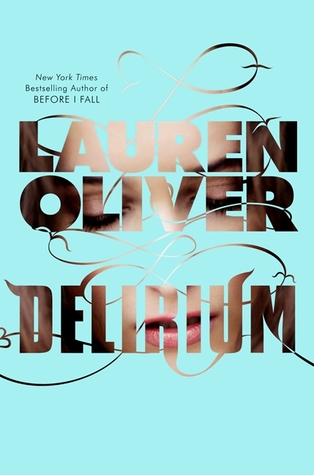 Synopsis: The government requires that all teenagers be cured of love, aka amor deliria nervosa, to keep society safe. But 95 days before her treatment, Lena Haloway falls for a boy--and must face the truth about her own feelings and the world in which she lives.
Synopsis: The government requires that all teenagers be cured of love, aka amor deliria nervosa, to keep society safe. But 95 days before her treatment, Lena Haloway falls for a boy--and must face the truth about her own feelings and the world in which she lives.Pages: 394
Rating: 8/10
Overall: An exciting dystopian novel that presents a very interesting idea of a world where love is forbidden. The foreboding detachment of the cured citizens provide a bleak but thought-provoking backdrop for a heady romance.
First things first: I enjoyed this a whole lot more than Matched, probably as much as Divergent, but not as much as The Hunger Games. Despite many many similarities and parallels with Matched, it was a generally more exciting book, with characters I cared more about, and a story I want to see through to the end.
Delirium has a very interesting premise where people live in a loveless society. Literally loveless because every person, when they turn 18, have a procedure aka the cure which removes people's ability to love. Love, or amor deliria nervosa, is treated as a disease, an infection of the brain. To be honest, this 'cure' sounds very like a lobotomy.
[...] every medical procedure carries a certain risk.
The 'side effects' of removing love don't just affect one's ability to create a romantic bond with another person, but are much more far-reaching. Lena, the main character, occasionally mentions some of these side effects: detachment to one's own children, lack of desire to do activities that were once thought of as hobbies, little to no dreaming... The list goes on. I found this creates a very bleak future to look forward to, even more so than that in Matched, where one's future is planned out to the smallest detail - at least you are allowed to love in the Matched society.
Another parallel to Matched is the lack of a named villain. The Hunger Games and Divergent have figure heads for their dystopian governments, President Snow and Jeanine respectively. Delirium and Matched both have these faceless governments which are Big Brother-like in their control of the population. While it is distinctly obvious who is in the wrong in Delirium, I personally want a somebody to direct my hate at. I hated President Snow, I hated Jeanine. These faceless governments leave me wanting.
On to the characters now. Lena, short for Magdalena, is the main character and she started off as someone who annoyed me a bit. As in, she had very little confidence in herself, in all sorts of ways. However, looking at the society these children grow up in - one where all the adults provide very little comfort and empathy - she is remarkably well-adjusted. As the book progresses, Lena became more likeable and a stronger person, as she realises that everything she had been taught was wrong, that giving and accepting love is something to embrace not resist.
Alex, the love interest, is a character we have a lot more to learn about. He's charming, good-looking and cunning. He introduces a whole new world to Lena, both literally and figuratively. I really hope we find out more about him and his past.
The side characters bring some good conflict for Lena to deal with. As she comes to terms with the fact that she now doesn't agree that love is a disease, she has to decide what to do. What will happen to her cousin(?) Gracie if she runs away? Or Hana, her best friend, who is due to have the cure soon. Will Hana remember her?
Her aunt and uncle highlight the effects of the cure on family ties. Her aunt and uncle have only taken Lena in after her mother's suicide out of duty rather than any sense of familial bond, and you can feel the toll this takes on not just Lena but Gracie and also Jenny (but in a different way). This lack of familial love from her aunt and uncle made it hard to feel any sympathy for them at any point, which I think makes you root for Lena more.
What I take away from this book is that love is not just the heady romance that is paraded as the be-all and end-all, but affects all corners of our lives. Life lived without love is not a life at all, but the illusion of one.














No comments on "Book Review: Delirium by Lauren Oliver"